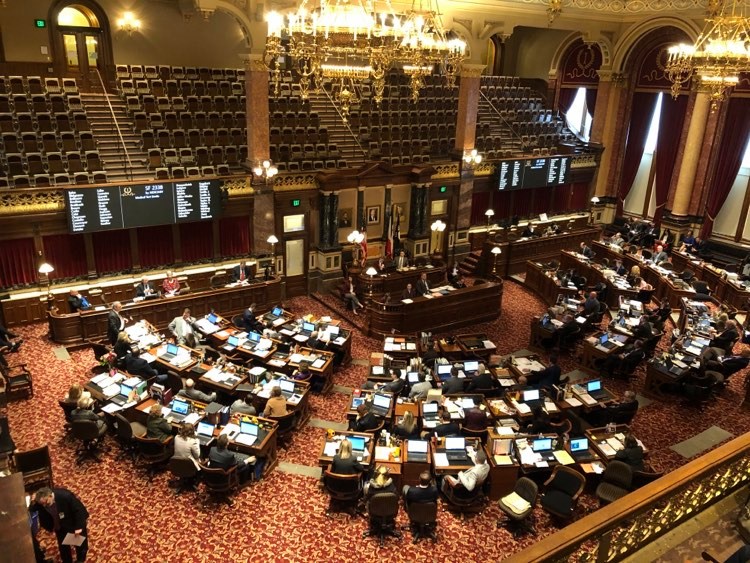Senate File 2338 caps noneconomic damages recoverable for any occurrence resulting in injury or death of a patient to $750,000.
Noneconomic damages mean damages arising from pain, suffering, inconvenience, physical impairment, mental anguish, emotional pain and suffering, loss of chances, loss of consortium or any other nonpecuniary damages.
“To be clear, this section does not change or otherwise place any cap on recovering on economic or punitive damages,” said Sen. Zach Whiting (R-Spirit Lake). “As legislators, we are tasked with making policy decisions to balance the need to compensate medical injuries with the need to keep our healthcare industry intact, especially in rural Iowa.”
Whiting said juries cannot consider the harm done to the healthcare industry when deciding an award, but legislator “can and should.”
Whiting said Iowa is becoming a less desirable place for doctors to start or maintain the practice of medicine. In five recent cases, more than $85 million has been awarded in total damages. Noneconomic damages ate up $63 million and some change, or 74 percent of all damages.
Sen. Tony Bisignano (D-Des Moines) introduced an amendment, but it failed. He asked Whiting why Republicans don’t simply trust Iowans to make decisions as a jury.
“I’m more shocked all the time in this body in the lack of trust and the lack of confidence that this body has in anybody else but this body,” he said. “About half this body, a little more than half.”
Bisignano said Senate Republicans have taken away local government’s right to just about do anything. Republicans don’t trust judges, and now, he said, they don’t trust juries.
“I don’t think you trust your own voters,” Bigisnano said. “You never run out of bad ideas to hurt people.”
Sen. Rob Hogg (D-Cedar Rapids) said the bill substitutes the judgment of the people for the Senate’s judgment. He talked about a case from Sioux County in which a 40-year old mom of four, who was married and a stay-at-home mom, went into a local hospital for a CT scan. During the procedure, she had a severe allergic reaction to the contrast dye that was administered.
“They gave her Benadryl,” Hogg said. “While she was in shock, according to news accounts, she screamed ‘help me, help me’ and became agitated.”
Hogg said staff held her down and didn’t do anything to deal with the shock she was experiencing.
“What she needed was an EpiPen,” he said. “So, you have a patient who goes in for a routine CT scan, has an allergic reaction, the medical providers simply fail to do what is recommended and she dies. She dies.”
Hogg added that Sioux County isn’t exactly the kind of place with runaway juries. The Sioux County jury awarded $28 million.
“Stay-at-home parent, four kids, spouse,” Hogg said. “What you are suggesting to do with this bill is arbitrarily say that damage can’t be more than $750,000. How dare you devalue what people do — what spouses and parents do.”
Hogg asked why there’s no cap for economic damages. If there’s a CEO making $13 million a year, why not cap economic damages at $750,000.
“Why don’t you do that,” Hogg asked. “If you’re serious about this, why pick on the mom who is taking care of her kids? Why are you doing that? This bill does not need to come out of this chamber today.”
Democrats took turns telling stories about Iowans who endured medical errors and were awarded large decisions.
Sen. Mariannette Miller-Meeks (R-Ottumwa) said there are heart-wrenching stories that could be told and she discussed the anxiety, angst, guilt and remorse doctors have even when there is no error but the outcome is bad.
She said the state needs to come up with a solution in order to attract providers to Iowa and to bring malpractice insurance down.
Sen. Nate Boulton (D-Des Moines) spoke against the bill at length.
“Take a minute and think about it,” he said. “What are you worth? What is your quality of life worth? What would it take for me to walk over to you and say, ‘I’ve got a deal for you. $750,001, I’m going to take your vision.’ Fairtrade? I get to take away your hearing. I get to take your ability to walk. I get to take your ability to walk around the Iowa State Fair and not know if you have just soiled yourself. Or, better yet, let’s not make this about you. Let’s make this about your spouse, your child or your grandchild.
“I’m going to tell you ‘here’s the deal. For $750,000, your grandchild is paralyzed from the neck down.’ Raise your hand if you’re ready to take that deal because that is the deal you are giving Iowans right now. It’s disgusting. This is shameful, to tell people what their lives are worth.”
Boulton said the discussion shouldn’t even be happening in the legislature.
“This is an embarrassing discussion for our state and yet here we are having it for a second time,” he said. “We’re sitting here telling Iowans their lives are only worth $750,000 because medical malpractice insurance companies aren’t quite profiting enough in our legal system.”
Boulton predicted more medical malpractice situations would arise from this bill.
“We’re not making medical care better or safer with this legislation,” he said. “We’re actually inviting it to get worse.”
Boulton said 10 years ago, there were 10,375 active medical licenses in Iowa. Today there are 12,747.
“We added more doctors, they’re not all gone,” he said.
Medical malpractice premiums were $8,307.42 on average in 2009. Now it is $6,457.88.
The bill passed the Senate 30-20, with Republicans Zach Nunn and Jim Carlin joining all 18 Democrats in opposition.












